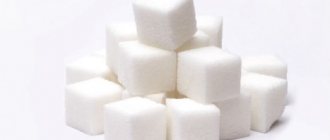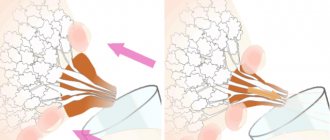For a newborn baby, breast milk is considered the best feeding option. Thanks to him, the mother not only strengthens his immunity, but also does not lose the connection she is accustomed to during nine months of pregnancy. Unfortunately, from time to time a situation with insufficient quantities may arise. The baby can be fed with a mixture. However, you should not rush into such a decision - initially you need to do everything to restore lactation.
Why might a nursing mother lose milk and what to do? Today there is a huge arsenal of methods that will restore breast milk production. More information about improving lactation can be found here.
What is the reason: what affects the decrease in lactation
Most breastfeeding women face the problem of lack of milk. Some notice a decrease in lactation a few weeks or a month after the baby is born, while for others, the well-established production of nutrient fluid suddenly fails and the baby does not get enough to eat. Many young mothers begin to panic: they do not know why this is happening, and most importantly, what to do to increase lactation.
Lactation crisis
Most often, less milk is produced during a lactation crisis. This is a period of time that takes about three days.
Breastfeeding consultants explain: every baby has developmental leaps, the sleep-wake schedule shifts, as a result of which the feeding schedule also changes. At this time, the baby needs more nutrition for full physical development, and the mother’s body has not yet had time to rebuild, so there may be less nutritional fluid.
Lactation crises are observed two and four weeks after the birth of a child, as well as three, six and eight months. But this is an absolutely normal phenomenon that all nursing mothers face. In most cases, women cope with the lack of milk within two to three days and breastfeeding can be maintained.
If it seems to you that the baby does not have enough milk, do not rush to switch him to formula, try to maintain breastfeeding
Psychological and physiological reasons
Milk production is not only a physiological process, but also a psycho-emotional one. Two hormones are responsible for the formation and release of nutrient fluid: oxytocin and prolactin. A surge in the body of the mother of the first occurs when the baby is nearby, laughing or crying, the woman is thinking about the child. And the second hormone is produced while the baby is suckling, thereby irritating the nipple. Therefore, lactation decreases for the following reasons:
- woman's health status. Very often, young mothers are faced with milk stagnation, lactostasis and even mastitis. In some cases, the doctor prescribes antibiotic therapy that is incompatible with breastfeeding, so breastfeeding has to be stopped during treatment. Naturally, less and less milk is produced;
- mother's psychological mood. Some mothers are not inclined to long-term breastfeeding: some decide to stop breastfeeding a few months after the birth of the baby, others set the goal of holding out for up to six months, and then introduce complementary foods and supplement the baby with formula. The reasons may be different, for example, a woman does not like the feeding process itself, it causes her negative emotions and even disgust. Psychologists repeat that lactation largely depends on the mood of the young mother. If she does not want to breastfeed her baby, gradually less and less milk will be produced;
- emotional overstrain. Stress, worry about the child’s health, postpartum depression, quarrels with husband and family. All these experiences negatively affect lactation;
- physical state. It’s not for nothing that doctors around the world insist that a nursing mother should rest as much as possible. Lack of sleep, fatigue, and general weakness are also reasons for decreased milk production. The body simply does not have enough strength to produce nutritional fluid for the baby;
- using pacifiers, feeding the baby from a bottle. Children very quickly understand that it is much easier to get food from a bottle. Therefore, very often they refuse the breast or suckle sluggishly and for a short time. The hormone prolactin is produced in smaller quantities, as a result of which milk production decreases;
- improper organization of feeding regimen. If the mother rarely puts the baby to the breast, the milk gradually becomes less and less. After all, the breastfeeding process is built on the principle of supply and demand: how much the baby ate at one feeding, so much liquid will arrive the next time;
- early introduction of complementary foods. WHO recommends introducing breastfeeding children to solid foods no earlier than 6 months. But the older generation stubbornly insists that from the age of two months the child can be given drops of juice and egg yolk. And some young mothers listen, starting to feed the child food that his body, due to the not yet formed enzyme system, cannot perceive;
- lack of nutrients and fluid in the mother's body. Of course, nature intended for a woman to breastfeed her baby. But if the mother eats an unbalanced diet and drinks little fluid, this negatively affects the lactation process;
- hormonal disbalance. The diagnosis can only be made by a doctor after conducting an examination and passing the necessary tests. In some cases, serious hormonal treatment will be required, and the baby will be transferred to artificial feeding.
Breast milk is the best nutrition for a baby
Pregnancy and lactation
Some women become pregnant during lactation. Some people are planning a baby and want their brother or sister to have a minimal age difference with their older child; for others, two lines on the test come as a complete surprise. But the main question that concerns young mothers remains open: is it possible to feed a baby during pregnancy? Doctors explain that it is possible to continue breastfeeding, but much depends on the individual characteristics of the nursing mother’s body.
Most women, upon learning about pregnancy, stop breastfeeding themselves and transfer the child to formula, so as not to harm the unborn baby.
Decreased lactation during pregnancy occurs for the following reasons:
- too much load. The body in such a situation works in two directions at once: first of all, it is configured to bear a fetus, and secondly, to produce milk to feed an existing child. But hormonal changes, the release of placental lactogen into the blood - a special placental hormone that inhibits lactation during pregnancy, can affect the decrease in milk supply;
- threat of miscarriage or premature birth. Often the mother is admitted to a hospital for safekeeping and it is simply not physically possible to breastfeed the older baby. The milk gradually disappears;
- doctor's recommendation. If a young mother has a difficult pregnancy, there is uterine tone, a threat of miscarriage or other problems, the obstetrician-gynecologist may recommend stopping breastfeeding for medical reasons.
Video: can milk burn out?
How to understand: symptoms of milk shortage and burnout
It is not enough to just breastfeed your baby; you need to be sure that the baby is getting enough nutrition. The full physical and mental development of the baby depends on sufficient receipt of all necessary vitamins and useful elements. But if lactation decreases, the baby does not receive enough valuable fluid. In this case, it is necessary to do everything to increase milk production or supplement the baby with formula.
Doctors pay attention: very often mothers only think that the baby is not eating enough. Actually there is no problem.
Reliable signs of lack of milk
But it's better to be safe and check. Experts identify reliable signs of a lack of breast milk:
- I am diagnosing my child as underweight. Once a month, children under one year of age are seen by a pediatrician. At the appointment, the doctor will weigh the baby and measure its height. Then he compares this data with the child’s age. If the baby weighs below normal, it means he does not have enough nutrition;
- a small amount of urine is released. A wet diaper test is recommended. Normally, a baby urinates ten or more times, depending on age. If the number of urinations is less than 10, this is a reason to consult a doctor.
Experts explain that when a child is sick, the number of urinations decreases, even if he has enough milk. It is therefore inappropriate to perform the test when the infant is in this condition. You should wait for complete recovery and only then draw conclusions.
Weight loss is one of the main signs of milk deficiency
If a mother observes one or more reliable signs in the baby, this is a reason to urgently consult a doctor. It is possible that the pediatrician recommends supplementing the baby with formula to compensate for the lack of nutrients in his body.
Possible signs of insufficient breast milk
There are also possible signs that the baby is not getting enough milk. However, doctors explain that even if these symptoms are detected, it is not necessary that the baby is malnourished. Perhaps the problem is completely different. This is just a signal to action for the mother to pay attention and consult with a specialist, if necessary. These signs include:
- baby is dissatisfied after feeding. He looks for the nipple, abruptly throws it away and again attaches himself to the breast. The baby is capricious, cries, and is overexcited;
- a woman cannot express fluid after the baby has already eaten;
- The baby spends a long time at the breast. He wants to get more milk, but he can't;
- The mammary glands do not enlarge during the milk flow before feeding. Usually a woman feels that the fluid is coming, especially if the break between feedings is three to four hours. When the milk burns out, the breast remains soft due to the small amount of milk in the mammary gland.
Video: consultation with a doctor about lack of milk during breastfeeding
What to do if breastfeeding is not possible
If, due to circumstances, your child still needs supplemental feeding, you should choose the right formula. In such cases, experts recommend a formula that is as close as possible to breast milk so that the child does not experience metabolic disorders, allergic reactions, skin or digestive problems. Closer to the composition of human milk are adapted formulas based on goat milk with beta-casein protein, for example, the gold standard of baby food - MD mil SP Kozochka. Thanks to this mixture, the baby receives all the necessary substances that help the child’s body form and develop correctly.
How to maintain lactation if the mother is in the hospital or is not near the child for a long time
Situations in life are different, and a mother may unexpectedly or planned end up in a hospital for inpatient treatment, or go to another city on business. In this case, breastfeeding the baby will not be possible, but it is possible to try to maintain breastfeeding. Experts give some useful tips:
- pump more often. You can carry out the procedure by hand or using a breast pump. Of course, stimulation of the nipples will not be as strong as during feeding the baby, but the hormone prolactin will be produced, and with it the formation of milk will not stop;
- do not worry, but think more about the child, setting yourself up for success in maintaining breastfeeding. The hormone oxytocin, which is responsible for the flow of fluid, is produced in the body even when thinking about the baby, the sound of his voice, etc. This is the hormone of love. But it is counterbalanced by adrenaline, which splashes out during stress, nervous tension, etc. More positive emotions and rest will prevent the milk from burning out, provided that the nipples are stimulated;
- eat well. Getting all the necessary vitamins and minerals into the body and getting enough liquid will only have a positive effect on lactation. Include in your diet foods that help increase milk production, for example, nuts, almonds, warm drinks;
Pharmacies sell special teas to support lactation. They are herbal based and have a pleasant taste.
- Look at the baby more often. In the digital age, this is not difficult, even if the baby is not nearby. Let your husband or relatives record a video and send it to you on your mobile phone. The opportunity to see the baby, hear his laughter or certain phrases promotes the production of oxytocin, which is useful for maintaining lactation.
How to restore lactation
To improve lactation and be able to continue to feed your baby with breast milk, experts recommend adhering to several rules.
Only positive emotions and good health
First of all, there must be harmony and balance in the emotional and physical state of the nursing mother:
- eliminate stress and nervous tension. More positive emotions and pleasant moments. Spending time with your baby helps a lot;
- rest more. Try to sleep at a time when your baby sleeps. At night, distribute responsibilities so that not only mom, but also dad gets up to the baby, for example, change the diaper. Send your husband for a walk with the baby, and take time for yourself to quietly drink tea, watch TV, etc.;
- follow the regime. Don't skip lunches and dinners. A nutritious and balanced diet for a nursing mother has a positive effect on milk production;
- to walk outside. This is not only useful for breastfeeding, but also for the general condition and strengthening of the immunity of both the woman and the baby.
Walking in the fresh air is useful for maintaining the well-being and mood of a nursing mother
Frequent breastfeeding
The best way to increase breast milk production is to put your baby to the breast more often. Therefore, try to stay close to the baby for several days and feed him on demand. Experts note that prolactin, which is responsible for the formation of nutrient fluid in the mammary gland, appears in greater quantities in the body of a nursing mother at night. Therefore, night feedings are very important during the period of restoration of lactation.
To produce even more milk, a woman can express herself after feeding her baby. There are many different models of breast pumps on the market. But if a young mother does not want to resort to using this product, the procedure can be easily done by hand.
You can freeze expressed milk and feed it to your baby when mom is not around
Balanced diet
The menu of a nursing mother should be varied and complete. Do not neglect breakfast or dinner, but have lunch on the go in the intervals between feeding and sleeping of the baby. This regime will only lead to exhaustion of the body and chronic fatigue. Women's menu should include:
- first courses: soups, broths from lean meats;
- side dishes: porridge (rice, oatmeal, buckwheat);
- dairy and fermented milk dishes and products: semolina porridge, fermented baked milk, kefir, yogurt, cottage cheese, butter;
- hard cheese;
- fresh vegetables and fruits.
You need to drink more warm liquid. Green or weak black tea with the addition of a small amount of honey is perfect (if the child is not allergic to this gift from bees). You can buy a special lactation mixture at the pharmacy and drink it instead of tea.
Don't forget about vitamins for nursing mothers. They are usually prescribed by obstetricians-gynecologists or recommended by a pediatrician. This is a good support for the mother’s body, because the main beneficial substances go with the milk to the baby.
Fresh fruits and vegetables are the main vitamins for a nursing mother
Breast abnormalities, diseases and other causes
Less than 3% of women with abnormalities of the mammary glands, less than 2% are susceptible to mastitis and lactostasis, which can manifest themselves in the first two months, and 7% develop early hypogalactia. In 13% of cases, feeding is rejected due to the need for antibacterial therapy for mother and child. In 32% of cases, the woman’s focus on development in the social sphere is affected, so the motivation for breastfeeding gradually decreases.
Breastfeeding women should drink enough fluids, and also use natural lactation aids (milk, green tea, special instant tea, infusion of raspberry leaves and dill seeds, eat nuts), take doctor's recommendations, perform exercises to train the pectoral muscles, find opportunities for relaxation, rest, receiving positive emotions, avoiding hypothermia and stress, putting the baby to the breast more often.











